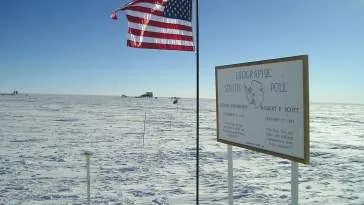(Just The News) As people are inundated with claims that the globe is suffering an immediate “climate crisis,” and “the hottest July ever” one leading expert in the field is advising people to take these narratives with a grain of salt.
Just the News spoke with Dr. John Christy, an Earth and atmospheric science professor at the University of Alabama in Huntsville, about the 2023 heat wave occurring across the United States. Specifically, Christy addressed the widespread claim that July 2023 was the hottest month on record and why he sees serious problems with declaring this.
“I see the main problems as perspective in time and space. July is always hotter than normal somewhere, so focusing on those spots misses the spatial aspect that there are other non-hotter than normal places,” Christy told Just the News. In terms of time, I use US stations with at least 100 years of data, so the present heat can be judged from a better perspective. When compared with other “hot” years, including the notorious 1936 heat wave, the US this year is not in record territory.”
EPA data shows that in fact the 1930s were when America’s hottest heat waves took place. According to the Washington Post, the 1936 wave resulted in around 5,000 deaths, and North Dakota hit 120 degrees Fahrenheit that July.
“If you look at decades at a time,” Christy continued, “2013–2022 is simply average for heat waves in the US and record high temperatures. Regionally, the West has seen their [sic] highest number of heat waves and record high temperatures in that decade, but the upper Midwest and Ohio Valley have seen their record LOWEST such metrics.”
“For the US as a whole, then, things have averaged out.”
But these facts are seemingly ignored by outlets across the media sphere. CNN, for example, recently touted a study that claimed the US/European heatwaves of 2023 would have been “virtually impossible” without climate change.
The cable outlet did not acknowledge the EPA’s data on the 1930’s heatwaves, in which the annual index for 48 out of 50 states was much higher than any other time in recent memory— and often, multiples higher, according to the Heartland Institute’s Justin Haskins.
Given the onslaught of media headlines declaring for a fact that climate change poses an immediate existential threat to the globe, Christy’s advice is to assume such reports overhyped or just flat out wrong.
In addition, clickbait media quoting climate activists are using unknowable absolutes like “hottest ever.” That ignores the fact that according to NASA, regular and reliable temperature measurements only began around 1880. Geologists say the Earth is probably 4.56 billion years old, and we currently live in the Cenozoic Era, which began 66 million years ago until today, according to the U.S. Department of the Interior’s U.S. Geological Survey (USGS).
“[My] advice would be to take the default position that a crisis story about climate is exaggerated or false, then look for the rest of the story,” Christy said. Some people use this [climate change] for political attention and gain,” while “others want the government to force the country to buy their products, citing renewable energy sources like wind and solar.”
Asked about how much, if at all, humans are responsible for global warming, Christy said, “No one knows how much the extra GHGs (Green Houe Gasses) have increased temperatures,” but that they estimate a 0.2 degree Fahrenheit increase over a decade.
“This rate of warming does not constitute a climate crisis and in many ways is creating more milder conditions for many areas of the planet compared with 150 years ago.”




















